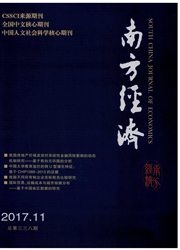

 中文摘要:
中文摘要:
一直以来,国内学者从交易量视角研究信息如何影响交易行为的文献并不多见。本文采用Bessembinder等(1996)定义的度量信息的代理变量对2000年1月至2006年12月A股市场上750只股票构建组合的交易量进行实证研究,发现市场层面的利好和利空信息对交易量有着非对称的影响,而公司层面信息的影响却是对称的;进一步的研究表明交易量在牛市和熊市中受到上述两个层面信息影响程度也是不相同,最后本文尝试从我国特有的制度因素以及行为金融学的角度对上述实证结果给出解释。
 英文摘要:
英文摘要:
All along, the studies about trading volume are not within the mainstream, and further studies concerning the trading activities to information shocks basing on the point of trading volume are even less. This article uses the proxy variables standing for market-level and firm-level defined by Bessembinder etc(1996) to empirically test the trading volume by the impact of information using the portfolio constructed by 750 A-Share stocks between Jan, 2000 to Dec, 2006. We find that "good news" and "bad news" of market-level has the symmetrical effect on the trading volume, while that of firm-level has the asymmetrical effect. Further more, we point out that both kinds of information have different impact on the investors' trading activities in the "bear" market from the "bull" market. Finally, we try to explain the empirical results from the perspectives of china's unique institutional elements and behavioral finance.
 同期刊论文项目
同期刊论文项目
 同项目期刊论文
同项目期刊论文
 期刊信息
期刊信息
